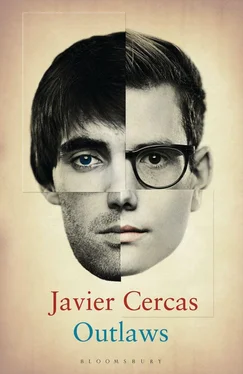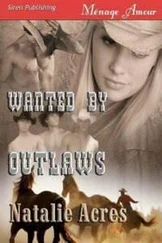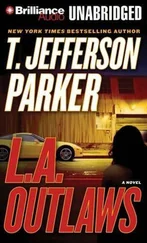‘We went up. When we got inside my flat I left my things on the counter and then went to the bathroom to find a clean towel so she could dry off; as I handed her the towel I asked her if she’d had dinner. No, she said. But I’m not hungry. I ignored that. While I made a salad and opened a bottle of wine and she set the table in the dining room, we talked about my place, a loft I’d bought a few years earlier from a Brazilian couple, he an architect and she a film director, or, to be precise, a director of documentaries and things like that. It wasn’t until I’d served her a bit of salad and a couple of falafels that I mentioned to Tere that I’d been to see Zarco. How did he seem to you? she asked. Fine, I lied. Older and heavier, but fine. He told me he’s fed up with prison. He asked me to get him out of there whatever it takes. Tere smiled. As if it were that easy, right? she said. He thinks it’s easy, I said, then added: Maybe it’s not so hard. Do you think so? she asked. I pulled a dubious face and answered: We’ll see.
‘Tere didn’t go on about the matter, and I thought it was premature to discuss my impressions and conjectures with her. While we were eating, Tere asked me about my life; I told her vaguely about my daughter, my ex-wife, my partners, my firm. Then I asked her; to my surprise, Tere replied with such an ordered account of events that it almost seemed prepared in advance. I learned that she’d lived in Gerona until she was seventeen, when the police arrested her after she participated in a bank robbery in Blanes, the summer after we met. That after her arrest she was tried and sentenced to five years in prison, of which she served two, at the Wad-Ras women’s prison. That in prison she got hooked on heroin and when she got out she stayed in Barcelona for almost a decade, living most of the time in La Verneda, earning a living with occasional jobs and occasional robberies that occasionally sent her back to prison. That in the second half of the nineties she spent several days in the Vall d’Hebron hospital on the brink of death due to a heroin overdose, and when she was discharged from hospital she agreed to be admitted to the Proyecto Hombre detox and rehabilitation centre. That she spent a good long while there. That she came out clean. That when she came out she tried to start a new life or what tends to be called a new life, and to do so she left Barcelona and returned to Gerona. That since then she had not had a drop or a speck of heroin or cocaine or any pills (except in the odd relapse). That she’d had lots of jobs and lots of men but no children. That she’d been working at the factory in Cassà for two years. That she’d started to study nursing that very year. That she didn’t like her job but she did like her course. That she was happy with the life she was leading.’
‘Didn’t you ask about Zarco?’
‘As soon as she stopped talking about herself. At first she seemed disinclined to answer, but I got out a second bottle of wine and she was soon talking about the relationship she’d had with him over those past twenty years.’
‘Had she gone on seeing him?’
‘Of course.’
‘It’s odd. As far as I recall, Zarco doesn’t even mention her in his memoirs.’
‘Your recollection is right, but his not mentioning her is more revealing than if he had mentioned her, because it means he took her for granted. Of course that’s what I say now, because now I know things I didn’t know then. . In any case, yes: although sometimes sporadically, they had gone on seeing each other. What Tere told me that night was that, during Zarco’s first years in prison, she visited him every once in a while and he turned to her when he was out on parole, when he escaped or when he had no one else to turn to. Later, for a long spell, the two of them stopped seeing each other. The reason is that in the middle of 1987, after Zarco escaped from the Ocaña penitentiary by taking advantage of the cocktail party after the press screening of The Real Life of Zarco , Bermúdez’s final film based on his life, Tere got mad at him and, although in the end she was the one who found him refuge in a friend’s house during his days on the run, she refused to visit him after he’d been recaptured. But what separated them completely, still according to Tere’s version, was that, once he was back in prison, Zarco began his great change: he went on being a famous delinquent but he tried to no longer be the implacable juvenile delinquent to become the mature repentant delinquent, a change in which he had no need of Tere or in which Tere was simply superfluous, because she was a hindrance from the past that he wanted to overcome. Still, years later Zarco called her again. It was after holding up a Barcelona jewellery store in the city centre and thus violating his third-stage release, one level before getting out on probation that he’d been granted for the first time in his life and which allowed him to spend the days outside and return to the prison to sleep; the absurd stupidity of the robbery meant this privilege was revoked and Zarco was put back on trial again and had many years added to his sentence of many already accumulated years, not to mention the disappointment it provoked in public opinion in general, which had believed in his rehabilitation, and among the politicians, journalists, writers, film-makers, singers, athletes and the rest of the people who’d supported the cause of his release: they all wrote him off as an incorrigible quinqui , as a persona with no future from the blackest days of Spain. Again he was defeated and dismissed and with no support from anybody, and again he turned to Tere, who at first told him to go to hell and finally ended up giving in, agreeing to see him and help him and help María to help him, who by then had appeared on the scene. She’d been working with her on Zarco’s behalf lately, until they came to see me.
‘That’s more or less what Tere told me that night, while we had dinner, or perhaps what she told me that night added to what she told me on other nights. Whatever the case, when we finished dinner and Tere finished telling me about Zarco, or she tired of doing so, we were a bit drunk. At that moment there was a rather long silence, which I was about to fill in by praising Tere’s loyalty and patience with Zarco or asking after Lina — who Zarco had told me Tere saw once in a while — but, before I could do so, she stood up from the table, went over to the stereo, crouched down and started looking through my few CDs. You still don’t like music, Gafitas, she said then. My daughter says something similar, I answered. But it’s not true. It’s just that I don’t listen to it much. Why’s that? asked Tere. I was going to say I didn’t have time to listen to it but kept quiet. Looking at the CD covers, Tere added, half-amused half-disappointed: And I don’t even know any of them. I got up from the table, crouched down beside Tere, pulled out a Chet Baker CD and put on a song called “I Fall in Love Too Easily”. When the music started to play, Tere stood up and said: Sounds old, but nice. Then she started to dance on her own, with the wine glass in her hand and eyes closed, as if searching for the hidden rhythm of the song; when she seemed to have found it she set her glass down on top of the stereo, came over to me, put her arms around my neck and said: You can’t live without music, Gafitas. I put my arms around her waist and tried to follow her. I felt her thighs against my thighs, her chest on my chest and her eyes on my eyes. I’ve missed you, Gafitas, whispered Tere. Thinking it was incredible that I hadn’t missed her, I said: Bullshit! Tere laughed. We kept dancing in silence, looking in each other’s eyes, concentrating on Chet Baker’s trumpet. Seconds or minutes later she asked: Do you fancy a shag? I took a moment to answer. Do you? I asked. Tere’s first reply was to kiss me; the second seemed redundant — I do, yeah, she said — although she immediately added: But on one condition. What condition? I asked. Tere also took a moment to reply. No ties, she finally said. She soon noticed that I hadn’t entirely understood. No ties, she repeated. No mess. No commitments. No demands. Each to his own. I would have liked to ask Tere why she said that, but it seemed like a way of looking for useless complications and a distraction from the essential, so I didn’t. It was Tere who asked: Yes or no, Gafitas?
Читать дальше












